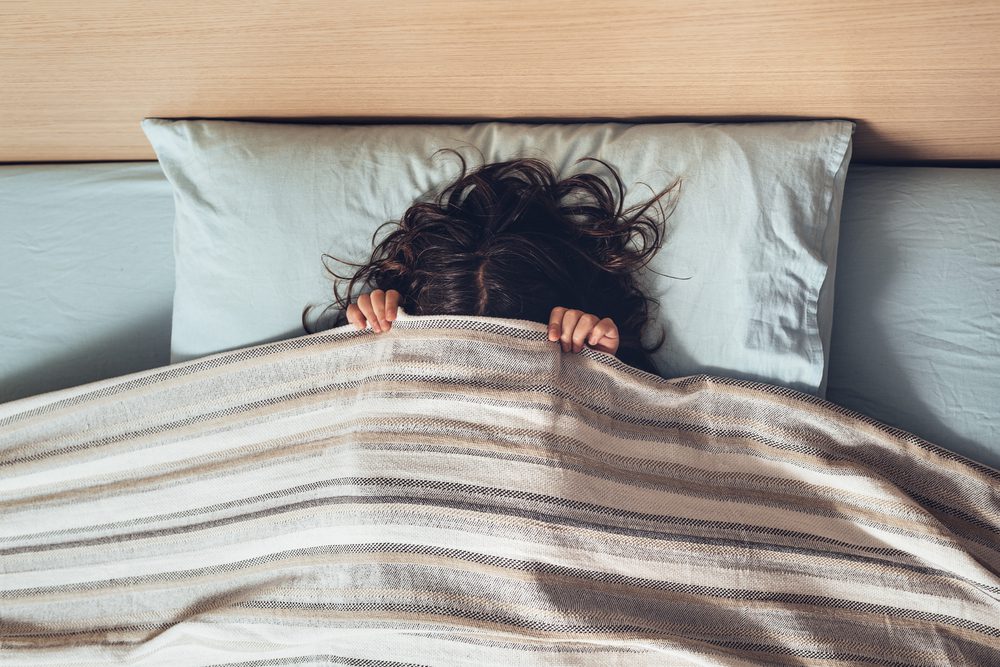If you’ve ever talked in your sleep, you are in the majority. Sleep talking is common among adults as well as children. And while some may find it embarrassing, sleep talking usually isn’t dangerous.
Despite its frequency, experts are still unsure why people talk in their sleep. Researchers continue to explore new theories about what sleep talking might tell us about the brain. But for now, we can examine what we do know and what we don’t know about sleep talking.
Key Takeaways
- Sleep talking, or somniloquy, is when a person talks during sleep without awareness.
- Sleep talking can be influenced by factors like stress, sleep disorders, and genetics.
- Especially in children, sleep talking is a common parasomnia, however many people do not know they talk in their sleep.
- If sleep talking affects sleep quality, consult with a sleep specialist and focus on stress reduction and good sleep habits.
What Is Sleep Talking?
Also known as somniloquy, sleep talking is a type of parasomnia. Parasomnias are unusual or undesirable behaviors that happen during sleep. Sleep talking can occur on its own, or alongside other parasomnias.
Sleep talking often occurs when an individual is just waking up. Yet, most people do not know that they are talking in their sleep while it is happening.
Sleep talking can happen during any of the stages of sleep, which include rapid eye movement (REM) sleep and non-REM sleep. This sets sleep talking apart from other parasomnias, which tend to occur during either REM or non-REM sleep.
How Common Is Sleep Talking?
Research notes it is difficult to know the exact prevalence of sleep talking, because it is difficult to study people who may not know they are sleep talking.
Yet, sleep talking is thought to be a common parasomnia. Experts estimate 70% of individuals do so at least once during their lifetime, and about half of children ages 3 to 13 talk in their sleep at some point.
Sleep talking tends to affect males and females at about the same rate. More research is necessary to determine how the condition impacts transgender and nonbinary individuals.
Symptoms of Sleep Talking
The main symptom of sleep talking is speaking during sleep without being aware that you are doing so.
People who talk in their sleep may vocalize single words, brief phrases, or complex sentences. Their speech can be loud, clear, and easy to understand, or it can be quiet or nonsensical. Usually, sleep talk does not address memories or refer to actual events in a person’s waking life.
Sleep talk can be unpleasant or loud, especially if one has a condition called REM sleep behavior disorder (RBD). Also, people who experience night terrors may say things that reflect fear or anxiety.
Although sleep talking is a parasomnia, experts consider it to be benign and do not recommend treatment for most cases. However, if other movements occur along with sleep talking, then another parasomnia may be present. And, if another parasomnia is present, it is possible that quality of life may be negatively affected.
Finally, some people who talk in their sleep may find it troubling or embarrassing, especially if they have a bed partner or share a room with others. Loud sleep talking can be disruptive and wake others who are sleeping nearby.
Why Do People Talk in Their Sleep?
Experts are still investigating why people talk in their sleep. Sleep talking often runs in families, so it may be at least partially genetic.
Sleep talking may be present in some individuals with certain mental health conditions. For instance, post traumatic stress disorder (PTSD) is associated with sleep talking. In addition, evidence suggests that sleep talking may be more common in children experiencing stressful events or who have symptoms of anxiety, depression, or behavioral disorders.
Researchers are unsure if sleep talking is related to dreaming. But, some researchers think sleep talking may offer insight into the dreaming mind and how the brain stores memories during sleep.
Sometimes, sleep talking is associated with other sleep disorders. These include sleepwalking, night terrors, and disorders that make people feel confused when they wake up. Sleep talking can also be a symptom of a condition called REM behavior sleep disorder.
REM Sleep Behavior Disorder
REM behavior sleep disorder (RBD) is a disorder that causes unusual behaviors during REM sleep, including sleep talking. People with RBD may talk in their sleep as they dream. They may also:
- Sing
- Whistle
- Shout
- Swear
- Give speeches
Normally, people’s muscles become temporarily paralyzed when they enter REM sleep. This paralysis ensures that people don’t act out their dreams. Those with RBD, however, do not experience this paralysis. As a result, they talk in their sleep and move about while dreaming.
RBD is common among individuals with neurological disorders like Parkinson’s disease and dementia. People may develop RBD years before they show other symptoms of a degenerative brain condition. However, other sleep disorders, head injuries, medications, and PTSD can also cause RBD.
What Does It Mean When You Talk in Your Sleep?
Researchers are still trying to understand why people talk in their sleep.
On its own, sleep talking does not usually indicate a medical problem. However, it can sometimes be part of another sleep condition, especially when it is combined with unusual physical movements. It may also indicate a family history of sleep talking, or a mental health condition like PTSD.
If sleep talking is negatively impacting your or your bed partner’s sleep, let your doctor know. You may also want to inform your doctor if you have experienced other symptoms or changes in your health, such as:
- Daytime sleepiness, loud snoring, or other symptoms of sleep apnea
- Unusual movements at night
- Sleep talking that begins at an older age
- Any episodes of nighttime confusion
- Taking a new medication
- Recent fever or illnesses
How to Stop Sleep Talking
Since the causes of sleep talking are not well understood, there is little evidence for how to stop it. Treatment for infrequent parasomnias is rarely needed. However, if treatment is needed, doctors may first try to look for any contributing factors like side effects from medication or other medical conditions. They may also recommend avoiding sleep deprivation.
Many parasomnias occur when a person’s sleep cycle becomes disrupted and they find themselves “trapped” between sleep and wakefulness. People often talk in their sleep just as they are waking up. Since an individual’s habits affect their sleep patterns, practicing good sleep hygiene might help in the treatment of parasomnias.
Better bedtime habits often require making simple lifestyle changes.
- Maintain a consistent sleep schedule: The body often has trouble adapting to new sleep patterns. Practice getting up and going to bed at the same time every day, even on the weekends.
- Avoid stimulants before bedtime: Caffeinated foods and drinks and nicotine can keep you up at night. Caffeine may take up to 8 hours to wear off, so save the coffee for earlier in the day.
- If necessary, adjust your medications: Some prescription medications and over-the-counter drugs can negatively impact sleep patterns. If you suspect that a medication is keeping you awake or causing you to talk in your sleep, let your doctor know. They may be able to offer an alternative or adjust your dosage.
- Make your bedroom an ideal place to sleep: Be sure that your sleeping environment is comfortable and promotes relaxation. Remove distracting electronic devices. Keep the room at a comfortable temperature and keep the lights low.
- Optimize your light exposure: Timing your exposure to light can help regulate natural sleep patterns. Try to spend at least 30 minutes in the sunlight in the morning, and dim all indoor lighting at night.
Tips for Sharing a Bed With a Sleep Talker
Having a bed partner who talks in their sleep can make it hard to get a good night’s rest. However, it is important to remember that they are most likely unaware of their sleep talking.
Sharing a bed can affect your sleep, but luckily there may be a few steps you can take to improve sleep with a partner.
- Wear earplugs: Try blocking out the sound with earplugs or noise-canceling headphones.
- Drown out the sound: Consider using a white noise machine to cover up the sound of your partner’s sleep talk. You can opt for a traditional white noise machine, or a more advanced device like the Hatch Restore 2 that plays white noise and doubles as a smart sunrise alarm. Playing music, running a fan, or utilizing another form of background noise can also be effective.
- Keep communication open: If your bed partner’s sleep talk is frequent, loud, or particularly disruptive, you may want to suggest that they consult with a sleep specialist. A sleep specialist can determine if their vocalizations are normal or a sign of a larger problem.
- Sleep separately: If all else fails, try sleeping in separate rooms. This may help both you and your partner get better rest with fewer interruptions.
Frequently Asked Questions About Sleep Talking
On its own, sleep talking can be a normal part of sleeping. However, if it is associated with other sleep disorders, then it may negatively impact your health. For example, if someone also has a REM behavior sleep disorder, then injury can happen if one attempts to act out movements that occur during dreams.
There are a couple of conditions that mimic sleep talking. People who have nocturnal epilepsy may vocalize in their sleep. Catathrenia is a sleep breathing disorder that causes a person to groan, but not talk, in their sleep.
This is a difficult question to answer, as experts are not yet entirely sure what causes sleep talking. On one hand, limited evidence suggests that children who experience stressful situations may talk in their sleep more than others.
On the other hand, experts don’t think that the words verbalized during sleep talk reflect waking events. Also, they do not know if there is a relationship between words being verbalized and events in the mind while sleeping. Thus, researchers note the need for additional studies on sleep talking and how it may reflect activity in the mind both while awake and asleep.
References
Ask the Sleep Doctor
Have questions about sleep? Submit them here! We use your questions to help us decide topics for articles, videos, and newsletters. We try to answer as many questions as possible. You can also send us an email. Please note, we cannot provide specific medical advice, and always recommend you contact your doctor for any medical matters.



